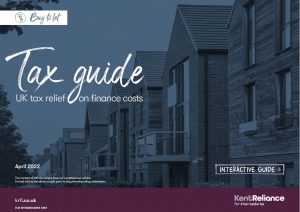
Buy to let ‘Tax Guide: UK tax relief on finance costs’
Kent Reliance for Intermediaries has worked with EY on the tax aspects of this guide which has been created to aid broker knowledge.
The full implications of the restriction to the deductibility of finance costs for individual landlords (introduced and phased in as of 6 April 2017) are now being felt by landlords. The full restriction has been in place since 6 April 2020 and will be keenly felt as people prepare and file self-assessment tax returns for the tax year ending 5 April 2021.
The restriction of relief in respect of finance costs incurred by individual landlords has had significant tax-cost implications for buy to let landlords as it’s been gradually introduced in recent years. The introduction of the restriction on relief has had a material effect on the cash flow position of buy to let rental businesses and has led landlords to reconsider the way they choose to run their rental portfolio.
Before any decisions are made by landlords, consideration needs to be given to areas such as income tax, corporation tax, stamp duty land tax (SDLT), inheritance tax and the annual tax on enveloped dwellings (ATED), as all of these could affect the tax efficiency of a property business.
Many buy to let landlords have considered the use of a limited company as a holding structure for their property portfolio. A limited company is not currently subject to the same finance cost restrictions as an individual, and for many landlords UK corporation tax on rental profits can be favourable when compared to UK income tax. As such, in certain circumstances, the use of a company can alleviate some of the tax pressures faced by landlords as a result of legislative change. This is a complex area of taxation and professional advice is essential.

